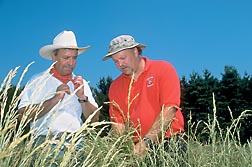Washington, DC, USA
November 1, 2011
 With the help of a U.S. Department of Agriculture (USDA) small business grant, Wisconsin farmer-breeder Peter Pitts teamed up with Pure-Seed Testing, Inc., of Hubbard, Ore., to create a now widely popular variety of conventional grass forage that is also probably the first certified organic festulolium in North America.
With the help of a U.S. Department of Agriculture (USDA) small business grant, Wisconsin farmer-breeder Peter Pitts teamed up with Pure-Seed Testing, Inc., of Hubbard, Ore., to create a now widely popular variety of conventional grass forage that is also probably the first certified organic festulolium in North America.
Pitts worked with Michael Casler, who was at that time a professor at the University of Wisconsin at Madison. Today Casler is a grass breeder in Madison, at the U.S. Dairy Forage Research Center operated by the Agricultural Research Service (ARS).
ARS is USDA's principal intramural scientific research agency, and the research supports the USDA commitment to sustainable agriculture.
Intrigued by Pitts' success with festulolium (pronounced "fes-tu-lo-lium"), a ryegrass (Lolium genus) with a small number of meadow fescue (Festuca) genes, Casler bred the grass with festulolium growing in old university nursery plots throughout Wisconsin. These plants had survived many years of "get tough or die" conditions like those on Pitts' old pasture on his 350-acre, mostly organic beef cattle farm.
Pure-Seed Testing's breeder, Crystal Fricker, screened the plants in Oregon for stem rust resistance, yield, and other desired characteristics. In 1996, breeder seed of the new variety, Spring Green, was produced.
Rose Agri-Seed, Inc., a sister company of Pure-Seed Testing, Inc., obtained exclusive marketing rights for Spring Green. The seed proved so popular that it is used throughout the world and is now sold by Land O' Lakes, Inc., in St. Paul, Minn. More than a million pounds of the conventionally grown seed were sold in its first five years on the market. It is becoming a staple ingredient in forage seed mixes.
Bill Rose of Rose Agri-Seed later had seed grown in Alberta, Canada, on land certified for organic farming. In its first few years on the market, 200,000 pounds of the organically grown seed were sold. Pitts, the University of Wisconsin and Pure-Seed Testing, Inc., share ownership of Spring Green.
The direct involvement of a farmer throughout the development and marketing phases of a new crop variety is rare in the United States.
Read more about this research in the November/December 2011 issue of Agricultural Research magazine.
Photo: Wisconsin farmer Peter Pitts (left) and ARS geneticist Michael Casler inspect festulolium ryegrass growing on Pitts’s farm in Spring Green, Wisconsin. Photo by Neil Tietz.
Una asociación para crear un pasto forrajero exitoso
Con la ayuda de una beca de negocio pequeño provista por el Departamento de Agricultura de EE.UU. (USDA por sus siglas en inglés), agricultor y criador de plantas Peter Pitts colaboró con la empresa Pure-Seed Testing, Incorporated, de Hubbard, Oregón, para crear una variedad muy popular de pasto forrajero convencional que también es el primer festulolium certificado orgánico en Norteamérica.
Pitts trabajó con Michael Casler, que entonces era profesor en la Universidad de Wisconsin in Madison. Ahora Casler es genetista y criador de pastos forrajeros en el Centro Estadounidense de Investigación de Forraje para Vacas Lecheras, el cual es mantenido por el Servicio de Investigación Agrícola (ARS) en Madison.
ARS es la agencia principal de investigaciones científicas del USDA, y esta investigación apoya la prioridad del USDA de promover la agricultura sostenible.
Como resultado del éxito de Pitts en criar festulolium, el cual es un tipo de ballica (del genero Lolium) con algunos genes de Festuca, Casler crió el pasto con festulolium creciendo en parcelas viejas mantenidas por la universidad en Wisconsin. Esas plantas han sobrevivido por muchos años en condiciones ambientales muy severas semejantes a las en el pastizal de Pitts en su granja principalmente orgánica de 350 acres donde él produce el ganado vacuno.
Crystal Fricker, quien es criadora de plantas con Pure-Seed Testing, evaluó las plantas en Oregón para probar su resistencia a la roya del tallo y estudiar sus rendimientos y otros rasgos deseables. En el 1996, los criadores produjeron semillas de la nueva variedad, llamada 'Spring Green'.
Rose Agri-Seed, Incorporated, la cual es una empresa asociada de Pure-Seed Testing, obtuvo los derechos exclusivos de comercialización para 'Spring Green'. La semilla era tan popular que ahora se usa mundialmente y actualmente es vendida por Land O' Lakes, Incorporated, de San Pablo, Minnesota. Más de 1 millón de libras de la semilla producida por métodos convencionales se vendieron en sus primeros cinco años en el mercado. Se está convirtiendo en un ingrediente muy importante en las mezclas de semillas de forraje.
Más tarde, Bill Rose de Rose Agri-Seed produjo las semillas en Alberta, Canadá, en tierra certificada para la producción orgánica. En sus primeros años en el mercado, 200.000 libras de semilla crecida orgánicamente se vendieron. Pitts, la Universidad de Wisconsin y Pure-Seed Testing comparten la propiedad de Spring Green.
La participación directa de un agricultor por todas las fases de desarrollo y mercadeo de una nueva variedad de cultivo es muy rara en EE.UU.
Lea más sobre esta investigación en la revista 'Agricultural Research' de noviembre-diciembre del 2011.